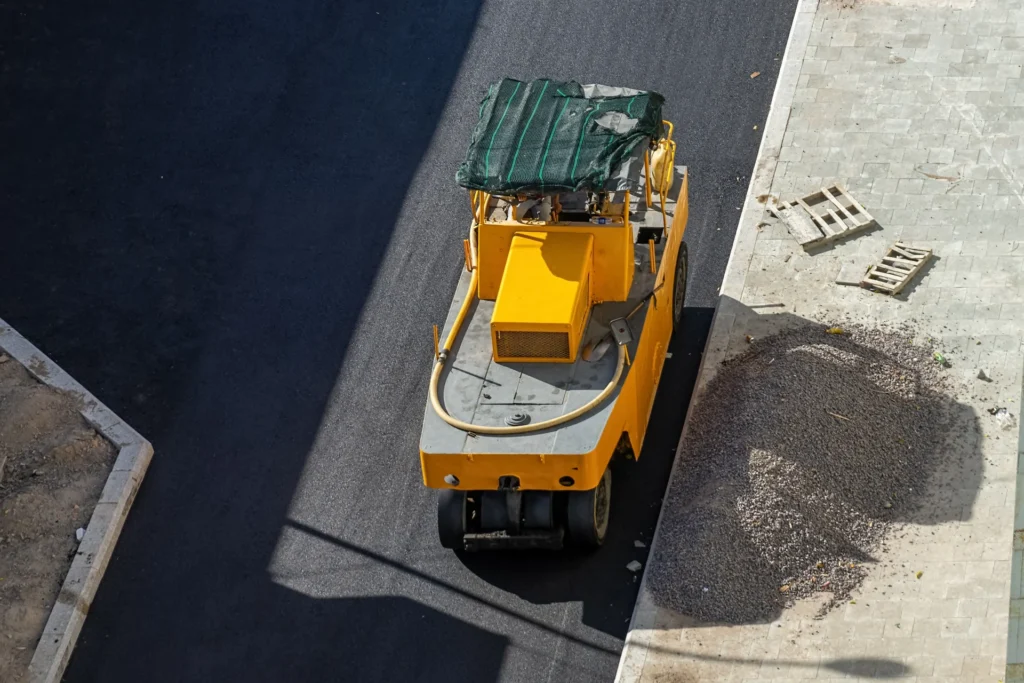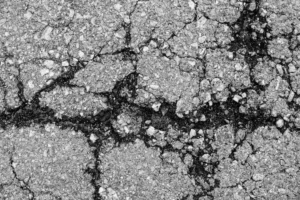Asphalt is a versatile pavement material that is used in various construction projects. It is widely used in roads, highways, airport runways, and commercial parking lots due to its ability to withstand heavy traffic loads and harsh weather conditions. Asphalt mixtures can vary in composition, depending on the type of aggregate and binder used.
There are five types of asphalt commonly used in construction, each with unique properties that make them suitable for specific applications. In this article, we will explore the different types of asphalt and when to use them. Understanding the characteristics of each type can help contractors and engineers choose the right material for their projects.
We will discuss the advantages and disadvantages of each type of asphalt and provide examples of when they are best suited for particular applications. Whether you are involved in road construction or simply curious about the science behind asphalt mixtures, this article will provide valuable insights into the world of asphalt engineering.
What Is An Asphalt Mix?
The asphalt mix is a blend of aggregates, asphalt cement, and additives that are combined to create a material suitable for paving. The mix is commonly used for constructing roads, parking lots, and other surfaces that require durability and weather resistance. The type of asphalt mix used depends on the specific application.
Hot mix asphalt (HMA) is the most common type of asphalt mix used in road construction. It is made by heating the asphalt cement to high temperatures before mixing it with aggregate. HMA is highly durable and can withstand heavy traffic loads. It is also resistant to temperature changes and can be used in extreme weather conditions.
Dense-graded mixes (DG mixes) are another type of asphalt mix commonly used in road construction. DG mixes have a higher percentage of fine aggregate than coarse aggregate, which gives them a smoother surface texture. They are also highly durable and can withstand heavy traffic loads.
Porous asphalt is an environmentally friendly alternative to traditional asphalt mixes. It allows water to drain through the pavement surface into an underlying stone reservoir, which helps reduce stormwater runoff and improve water quality. Porous asphalt is commonly used in commercial parking lots, sidewalks, and other areas where runoff can be an issue.
Why does the asphalt mix matter? The type of asphalt mix used affects the performance and longevity of the paved surface as well as its environmental impact. Choosing the right type of mix for a specific application can help ensure that the pavement lasts longer, has minimal maintenance requirements, and meets sustainability goals.
Why Does The Asphalt Mix Matter?
The type of asphalt used in pavement construction plays a significant role in the longevity and durability of roads. With different types of asphalt available, it is important to understand their properties and when they should be used.
Cold mix asphalt is a commonly used material for repairing potholes, cracks, and other minor pavement damage. It does not require heating before application, making it suitable for use in colder weather conditions.
On the other hand, hot mix asphalt is widely used in constructing new pavements due to its high durability and resistance to wear and tear. This type of asphalt requires heating before application, which allows it to be compacted more effectively. Hot mix asphalt can withstand high traffic volumes and heavy loads, making it ideal for use on highways and major roads.
The choice of the type of asphalt to be used also depends on the weather conditions prevailing in the area where the pavement will be constructed. For instance, cold-mix asphalt is best suited for areas with low traffic volume or where temperatures are too low for hot-mix applications. Hot mix asphalt is better for areas with high traffic volumes or where temperatures are consistently high.
In summary, the choice of the type of asphalt to be used depends on various factors such as weather conditions and expected traffic volume. While cold-mix asphalt may suffice for minor repairs, hot-mix asphalt is preferred for building durable pavements that can withstand heavy loads and high traffic volumes.
The subsequent section will delve deeper into hot-mix asphalt and the unique properties that make it an ideal choice for road construction projects.
Hot Mix Asphalt
Hot Mix Asphalt (HMA) is a widely used type of paving material due to its durability and cost-effectiveness.
It is a combination of aggregate and bitumen, which offers many benefits such as increased resistance to weather, reduced likelihood of rutting, and improved handling of traffic.
HMA is commonly used for asphalt roads, highways, and airfield pavements, as well as parking lots and driveways.
Furthermore, HMA may also be used in the construction of driveways, sidewalks, and bike paths.
Benefits Of Hot Mix Asphalt
Hot mix asphalt is a popular choice for paving projects because of its numerous benefits. The use of hot mix asphalt ensures that the pavement is strong and durable, making it ideal for high-traffic areas. Additionally, hot asphalt has the ability to resist damage from extreme weather conditions such as heavy rainfall, snow, and ice. This means that the pavement can maintain its integrity even in harsh weather conditions.
There are different types of asphalt pavement available, each with unique qualities that make them suitable for specific applications. Hot mix asphalt is one such type that is commonly used in road construction due to its excellent durability and strength. It is made by heating up aggregates and binding agents at high temperatures to create a dense mixture that can withstand heavy loads.
Asphalt contractors recommend using hot mix asphalt for roads, highways, residential driveways
parking lots, and other high-traffic areas because of its long lifespan and low maintenance costs. The use of this type of asphalt ensures that the pavement lasts longer without requiring frequent repairs or replacements. Moreover, it can be customized to meet specific project requirements by adjusting the aggregate size, binder type, and gradation.
In conclusion, hot mix asphalt offers several benefits over other types of asphalt such as enhanced strength, durability, and resistance to harsh weather conditions. Its use ensures that paved driving surfaces last longer while requiring less maintenance over time. Asphalt contractors recommend using hot mix asphalt for road construction projects and other high-traffic areas because it provides a cost-effective solution that meets project requirements while also delivering long-lasting results.
Uses Of Hot Mix Asphalt
Hot mix asphalt is a popular choice for pavement construction, but what are its specific uses? There are various asphalt types available and each has unique qualities that make them suitable for specific applications.
Hot mix asphalt is one such type that is commonly used in road construction, highways, parking lots, and other high-traffic areas. It is a flexible and cost-effective solution that provides long-lasting results. Asphalt contractors use hot mix asphalt because it offers superior strength, durability, and resistance to harsh weather conditions.
This makes it ideal for high-traffic areas where damage can occur frequently. Hot mix asphalt is also known as the permanent solution since it lasts longer without requiring frequent temporary repairs or replacements. The type of asphalt used depends on the project requirements and specifications.
In addition to paving roads and highways, hot-mix asphalt has many other uses. For instance, it can be used as an asphalt mix for driveways or sidewalks. Contractors can customize the asphalt mixture by adjusting the aggregate size, binder type, or gradation to meet specific project needs.
This allows for a more tailored solution that addresses unique project requirements. In summary, hot mix asphalt provides numerous benefits over other types of asphalt such as enhanced durability, strength, and resistance to harsh weather conditions. It is a versatile material that can be customized to meet specific project requirements making it ideal for construction projects that require flexibility in design.
With all these benefits in mind, it’s easy to see why hot mix asphalt remains one of the most popular choices among contractors and engineers alike when considering a long-lasting paving solution.
Driveway Mix
Driveway Mix is a blend of aggregate materials that is ideal for both asphalt driveways and parking lots. It is designed to provide a smooth asphalt surface with good light-duty durability. Additionally, it is a cost-effective option compared to other mixes.
Warm Mix Asphalt
Warm Mix Asphalt (WMA) is a type of asphalt mix that is produced at lower temperatures than traditional hot mix asphalt. This process involves adding a small amount of water to the asphalt mixture to allow it to be mixed and compacted at lower temperatures, which helps reduce greenhouse gas emissions and energy consumption.
WMA has become increasingly popular in recent years due to its environmental benefits and improved workability. WMA can be used for a variety of applications, just like other types of asphalt. However, it is commonly used in road construction projects where there are concerns about the environment and sustainability.
The use of WMA can also result in cost savings since it requires less energy to produce than hot mix asphalt. One type of asphalt used with WMA is known as Perpetual Pavement. This type of pavement design involves building an asphalt pavement structure that can withstand significant traffic loads without requiring major rehabilitation or reconstruction for 50 years or more.
Perpetual Pavements are designed using several layers, including a strong subbase layer, high-quality binder material, and a durable wearing course. In summary, Warm Mix Asphalt is a common type of asphalt mix that has gained popularity due to its environmental benefits, cost savings, and improved workability.
It can be used for various applications similar to other types of asphalt mixes but is commonly used in road construction projects where sustainability is a concern. Additionally, Perpetual Pavement is one type of asphalt design that can be built using WMA and provides long-lasting durability while minimizing maintenance costs.
Moving on from Warm Mix Asphalt (WMA), another type of asphalt mix that has been gaining attention in recent years is MC Cold Mix.
Mc Cold Mix
Warm Mix Asphalt is a type of asphalt that is produced at lower temperatures compared to other traditional hot mix asphalts. The production process involves the use of asphalt cement mixed with water, which then forms a foam before it is added to the mixture. This type of asphalt has lower emissions, energy consumption, and fumes compared to other types of asphalt. Warm Mix Asphalt can be used in different traffic conditions, including high-traffic roads and highways.
Another type of asphalt that is widely used is MC Cold Mix. As the name suggests, this type of mix is produced at relatively low temperatures and can be installed in cold weather conditions. MC Cold Mix does not require any heating or drying process during installation, making it an ideal choice for emergency repairs and temporary solutions. However, it may not be suitable for areas with heavy traffic since it may not provide a permanent solution.
When choosing the right type of pavement, various factors such as traffic conditions and environmental considerations need to be taken into account. The selection process also involves determining the appropriate grade and mix design to ensure long-lasting performance. Dense-graded mixes are one option that can provide excellent durability and resistance to the distress caused by traffic loading.
MC Cold Mix offers several advantages over traditional hot-mix asphalts, including faster installation times and reduced labor costs. However, it may not always provide a permanent solution in high-traffic areas due to its relatively low-strength properties.
In the next section, we will discuss dense-graded mixes and how they compare to other types of asphalt for various applications.
Dense-Graded Mixes
Dense-graded mixes, also known as asphalt concrete, are a popular choice for road construction due to their durability and ability to withstand heavy traffic. This type of asphalt consists of a mixture of coarse aggregates, fine aggregates, mineral filler, and asphalt binder that is mixed together at high temperatures.
One of the primary benefits of using dense-graded mixes is their ability to resist water runoff. Water can cause significant damage to roads by eroding the surface layer and weakening the base pavement layers underneath. The dense structure of this type of asphalt prevents water from seeping into the pavement and causing damage.
There are several different types of dense-graded mixes available that vary in their aggregate size and composition. Four common variations include:
- Open-graded friction course (OGFC): This mix contains large aggregate particles that allow for better drainage and skid resistance.
- Stone matrix asphalt (SMA): SMA uses a higher percentage of crushed stone in the mix for added durability.
- Permeable friction course (PFC): PFC is designed to be porous, allowing water to drain through and reduce runoff.
- Polymer-modified asphalt (PMA): PMA uses polymers in the mix to improve flexibility and resistance to cracking.
Overall, dense-graded mixes offer an excellent solution for road construction projects where durability and resistance to water damage are essential factors. With various options available, it is crucial to choose the right type based on project requirements and expected usage.
The next section will discuss another type of asphalt known as porous asphalt which is specifically designed for its ability to allow water to penetrate through its surface layer.
Porous Asphalt
After discussing dense-graded mixes in the previous section, it is important to delve into another type of asphalt called porous asphalt. Unlike dense-graded mixes, this type of asphalt has high permeability and is designed to allow water to pass through it. Porous asphalt is also known as an open-graded friction course (OGFC) and is commonly used in areas where there is a need for effective drainage to stop water pooling.
Porous pavement has several advantages over other types of asphalt. Firstly, it helps reduce the accumulation of water on road surfaces, which can cause hydroplaning and reduce skid resistance. Secondly, it helps improve air quality by reducing the amount of stormwater runoff that carries pollutants into natural water bodies. Finally, porous asphalt reduces noise levels by absorbing sound waves.
However, there are certain limitations associated with porous asphalt that must be taken into consideration before using them. For example, it cannot be used in areas where heavy traffic loads are expected or where there is a risk of high-speed tire wear.
Additionally, proper maintenance is required for porous asphalt to function effectively and prevent clogging from debris.
Conclusion
Asphalt mixes are essential for building roads and pavements, and using the right type of asphalt mix is crucial for ensuring durability and longevity.
Hot Mix Asphalt (HMA) is the most commonly used type of asphalt mix, which is produced at high temperatures to ensure better compaction and longer life.
Warm Mix Asphalt (WMA) is a more environmentally friendly alternative to HMA, produced at lower temperatures with less energy consumption.
MC Cold Mix is another type of asphalt mix that can be used in cold temperatures where hot mixes are not feasible.
Dense-graded mixes are designed for high-traffic areas and heavy-duty applications, while Porous Asphalt is ideal for areas with high rainfall or drainage issues.
Understanding these different types of asphalt mixes can help engineers and professional paving contractors choose the best option for their specific project needs.
Choosing the right type of asphalt mix is crucial for achieving successful road construction projects. Engineers and contractors must consider factors such as climate, traffic volume, drainage, and environmental impact when selecting an appropriate asphalt mix.
By understanding the properties of each type of asphalt mix, they can select the one that offers optimum durability, longevity, and cost-effectiveness. Therefore, it’s important to have a solid understanding of the different types of asphalt mixes available in order to make informed decisions for successful road construction projects.



